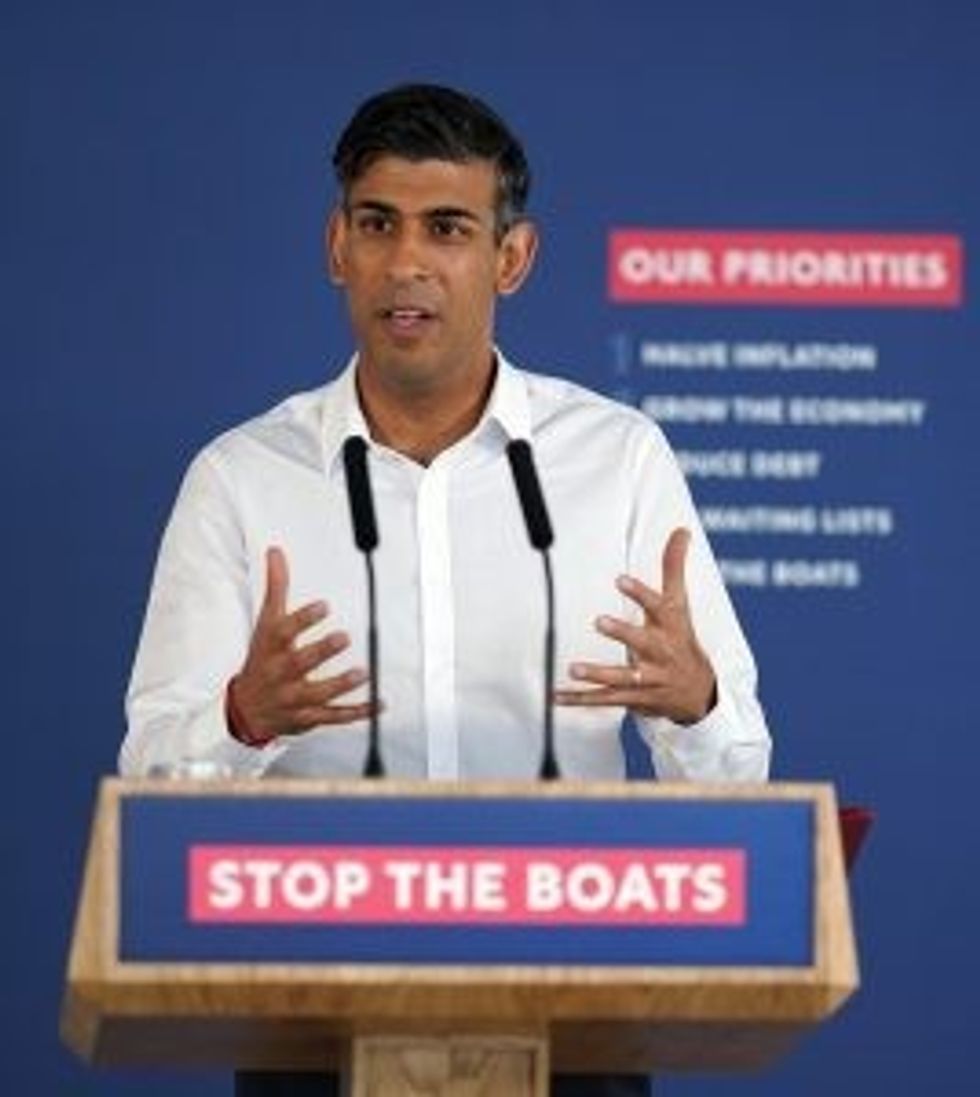PUBLIC dissatisfaction with how the government is handling immigration is at its highest level since 2015, according to a new survey.
In May this year, Office for National Statistics (ONS) data revealed that net migration to the UK reached a record high of 606,000 in 2022, driven by people from outside the European Union coming to work or study. People arriving from Ukraine and Hong Kong under special visa schemes also contributed to the number.
The Immigration Attitudes Tracker from the market research firm Ipsos and the think tank British Future show that two-thirds of the public (66 per cent) are dissatisfied with the government’s handling of immigration – the highest level in the tracker’s history. Just 12 per cent say they are satisfied.
A little more than a fifth (22 per cent) of Conservative supporters are satisfied with the government on immigration while more than half of Tories (56 per cent) are dissatisfied – a quarter (26 per cent) being “very dissatisfied”.
Almost three-quarters (73 per cent) of Labour supporters are dissatisfied with how the government is dealing with immigration while eight per cent say they are satisfied. The top reason cited for dissatisfaction is the failure of the government to stop Channel crossings, but responses are divided by politics.
More than 21,000 people reached British shores by crossing the English Channel illegally so far in 2023, official figures showed last week. More than 100,000 migrants have arrived on small boats since the UK started publicly recording the arrivals in 2018.
Prime minister Rishi Sunak has made “stopping the boats” a key priority of his Conservative government which branded the cross-Channel route “illegal”.
It passed legislation blocking asylum applications from anyone arriving without prior authorisation.
The survey findings reveal that for Labour supporters who are unhappy with the government on immigration, “creating a negative or fearful environment for migrants” (46 per cent) and “not treating asylum-seekers well” (45 per cent) are equally important reasons for dissatisfaction as “not doing enough to stop channel crossings” (46 per cent).
Some 82 per cent of Conservative supporters say “not doing enough to stop Channel crossings” is a reason for their dissatisfaction and only nine per cent cite “creating a negative or fearful environment for migrants”.
A reduction in the immigration numbers finds wider support than allowing the figures to remain at the current level or rise, although more people think the arrival of overseas people has a positive impact on the UK than those who feel such development is negative.
The tracker survey finds that 48 per cent of the public now supports reducing immigration (up from 42 per cent in 2022), compared to 44 per cent who would prefer numbers to stay the same (22 per cent) or increase (22 per cent).
Support for reducing immigration is still nearly 20 points lower than in 2015, the first year of the tracker, when 67 per cent of the public backed reductions. More people (43 per cent) think that immigration has had a positive impact on the UK than the 37 per cent who feel its impact has been negative. But negativity has increased by eight points from 29 per cent since 2022.
Attitudes are divided by politics. Twothirds of Conservative supporters (67 per cent) now favour reducing migration, compared to only 38 per cent of Labour supporters who favour reductions. More than half (56 per cent) of Labour supporters say immigration numbers should increase (28 per cent) or stay the same (28 per cent), compared to 30 per cent of Conservatives who say numbers should either increase (16 per cent) or stay the same (14 per cent).
Sunder Katwala, director of the British Future thinktank, said: “The government’s approach to immigration, particularly asylum and small boats, is disappointing everyone – but for different reasons. Liberals think it is inhumane, while hardliners think it isn’t achieving what has been promised. What they all have in common is the feeling that the government isn’t doing a good job.
“Attitudes to immigration are nuanced but the sharp divide along party political lines means we should expect a noisier, more heated immigration debate as Britain heads towards a general election.
“But politicians won’t rebuild public trust by raising the volume of the debate - that will take workable solutions, particularly on asylum, that balance control and compassion.”
Some 71 per cent say they do not trust the Conservatives to have the right policies towards migrants crossing the Channel, with just 21 per cent saying they trust Sunak’s party, the research finds.
About a third (32 per cent) of people say they trust the opposition Labour to have the right policies on Channel crossings, yet it is distrusted by 53 per cent.
About 52 per cent of Conservative supporters say they do not trust their own party on Channel crossings. On the other hand, Labour supporters do trust their party on the issue: 60 per cent say they trust Labour to have the right policies, while 28 per cent do not. However, the new survey also finds that support for migration for specific jobs remains largely steady.

More than half the public would like to see the number of migrant doctors (53 per cent) and nurses (54 per cent) increase, while less than one in seven favour reductions (13 per cent for doctors and 14 per cent for nurses). For care workers, 46 per cent would like to see numbers rise, 28 per cent would rather they stay the same and only 17 per cent would like to see them reduced. Nearly three-quarters of skilled worker visas last year were for health and care roles.
The picture is similar for other jobs as well. Only 18 per cent of the public would like to reduce the number of migrants coming to work as seasonal fruit and vegetable pickers, while 43 per cent would prefer the number to increase and 30 per cent say the numbers should stay the same.
A little less than a quarter of public (24 per cent) want fewer migrant lorry drivers while 66 per cent would rather numbers stay the same (35 per cent) or increase (31 per cent); and 24 per cent would prefer fewer migrants coming to work in construction, while 66 per cent think numbers should stay the same (33 per cent) or increase (33 per cent).
Gideon Skinner, head of political research at Ipsos, said immigration has been moving up the political and public agenda this year.
“But with an election on the horizon and attention on the issue of immigration and asylum unlikely to go away, there isn’t much trust in either of the main parties to get the balance right.”



















